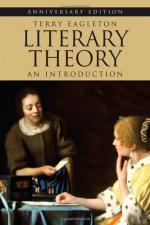
|
| Name: _________________________ | Period: ___________________ |
This quiz consists of 5 multiple choice and 5 short answer questions through Chapter 5, Psychoanalysis.
Multiple Choice Questions
1. For the economist Eagleton discusses, "those economists who dislike theory or claimed to get along better without it" were what?
(a) Didn't understand the importance of theory.
(b) Had no knowledge of any theory.
(c) In the grip of the most current theory.
(d) In the grip of an older theory.
2. According to Eagleton, the Russian formalist shifted their attention to the "material reality" of what?
(a) The text.
(b) The critic.
(c) The fiction.
(d) The facts.
3. What kind of language does Eagleton say people think of literature as?
(a) Ordinary.
(b) Strange.
(c) Dull.
(d) Difficult.
4. According to Eagleton, William Empson "insists on treating poetry as a species of ______language."
(a) Ordinary.
(b) Secular.
(c) Religious.
(d) Spectacular.
5. According to Eagleton, the sentence "this is awfully squiggly handwriting" from Knut Hamsun's "Hunger" tells him its literary because of what reason?
(a) The ideas.
(b) The context.
(c) The content.
(d) The facts.
Short Answer Questions
1. According to Eagleton, there are forms of post-structuralism that represent what kind of withdrawal from history?
2. Who wrote "What is Literature" on literary reception and was published in 1948?
3. According to Eagleton, Stanley Fish's model excludes the possibility that there is a ______ of interpretations?
4. According to Eagleton, structuralism exposed what "shocking truth"?
5. What are Northrop Frye's four narrative categories at the root of all literature?
|
This section contains 277 words (approx. 1 page at 300 words per page) |

|




